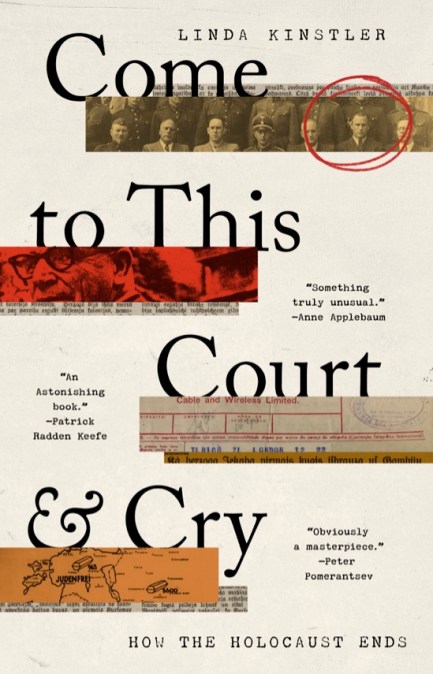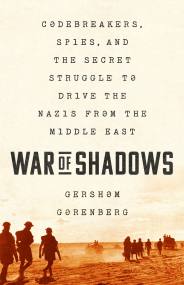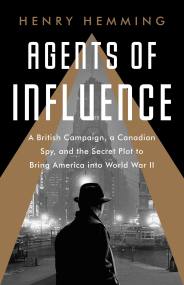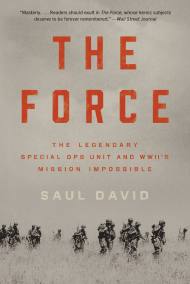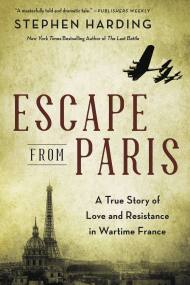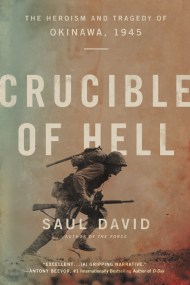Shopping Cart
Come to This Court and Cry
How the Holocaust Ends
Description
In 1965, five years after the capture of Adolf Eichmann in Buenos Aires, one of his Mossad abductors was sent back to South America to kill another fugitive Nazi, the so-called “butcher of Riga,” Latvian Herberts Cukurs. Cukurs was shot. On his corpse, the assassins left pages from the closing speech of the chief British prosecutor at the International Military Tribunal at Nuremberg:
“After this ordeal to which mankind has been submitted, mankind itself . . . comes to this Court and cries: ‘These are our laws—let them prevail!’”
Years later, the Latvian prosecutor general began investigating the possibility of redeeming Cukurs for his past actions. Researching the case, Linda Kinstler discovered that her grandfather, Boris, had served in Cukurs’s killing unit and was rumored to be a double agent for the KGB. The proceedings, which might have resulted in Cukurs’s pardon, threw into question supposed “facts” about the Holocaust at the precise moment its last living survivors—the last legal witnesses—were dying.
Rich with scholarly detective work and personal reflection, Come to This Court and Cry is a fearlessly brave examination of how history can become distorted over time, how easily the innocent are forgotten, and how carelessly the guilty are sometimes reprieved.
“After this ordeal to which mankind has been submitted, mankind itself . . . comes to this Court and cries: ‘These are our laws—let them prevail!’”
Years later, the Latvian prosecutor general began investigating the possibility of redeeming Cukurs for his past actions. Researching the case, Linda Kinstler discovered that her grandfather, Boris, had served in Cukurs’s killing unit and was rumored to be a double agent for the KGB. The proceedings, which might have resulted in Cukurs’s pardon, threw into question supposed “facts” about the Holocaust at the precise moment its last living survivors—the last legal witnesses—were dying.
Rich with scholarly detective work and personal reflection, Come to This Court and Cry is a fearlessly brave examination of how history can become distorted over time, how easily the innocent are forgotten, and how carelessly the guilty are sometimes reprieved.
Praise
“In her completely absorbing and profound debut, Kinstler sets out to solve a mystery—journeying from a murder scene in Uruguay to the former killing fields of Europe to unravel a family secret about her late grandfather—and in the process unearths vexing questions about the past and how we understand it. Part detective story, part family history, part probing inquiry into how best to reckon with the horrors of a previous century, Come to This Court and Cry is bracingly original, beautifully written, and haunting. An astonishing book.”
—Patrick Radden Keefe
“Obviously a masterpiece. A book that makes the Holocaust fresh, slipping seamlessly between story, thinking, politics, poetry, and the personal.”
—Peter Pomerantsev
“Linda Kinstler has achieved something truly unusual: A book that captures the paradoxes and nuances of memory politics in contemporary Eastern Europe, while at the same time invoking the trauma that past tragedies leave on individuals and families. Using rigorous, evocative prose, she reminds us of the dangerous instability of truth and testimony, and the urgent need, in the twenty-first century, to keep telling the history of the twentieth.”
—Anne Applebaum
“In this searching and powerful book, Kinstler sets out to solve the mystery of her grandfather’s role in the genocide of Latvia’s Jews during World War II. But the questions she ends up confronting—about national pride, the need for heroes, and the elusiveness of the past—couldn’t be more relevant in the twenty-first century. Come to This Court and Cry is an exemplary work of investigative journalism and historical research, showing why writers like Kinstler are needed now more than ever.”
—Adam Kirsch
“First, I was moved, then I was gripped, and now I am haunted by Kinstler’s astonishing new book. Its story is a universal one and its contribution to Jewish thinking about the Holocaust is considerable.”
—Ben Judah
“Before reading (devouring) Come to This Court and Cry, I wouldn’t have thought a book like this was even possible. A moving family portrait on top of a sensational whodunit murder on top of a brilliant mediation on memory, the law, and identity? And yet here it is. Kinstler has threaded the needle. This book is many things, and yet it fits together perfectly—personal without being sentimental, creative without being precious, and has such astute legal and historical analyses without being ponderous; it’s a marvel.”
—Menachem Kaiser
“[A] gripping debut… a deeply researched, engrossing and important look at how Holocaust stories have been passed down and altered.”
—Washington Post
“Journalist Kinstler debuts with a captivating investigation…The result is a fascinating and often troubling account of how the past haunts the present.”
—Publishers Weekly
“A masterful synthesis of family history and Holocaust investigation that blurs lines among perpetrators, justice, and national identity… A vital addition to the finite canon of Holocaust studies rooted in personal connection.”
—Kirkus, starred review
“A tremendous feat of storytelling, propelled by numerous twists and revelations, yet anchored by a deep moral seriousness.”
—The Guardian
“Come to This Court and Cry combines meticulous historical research with philosophical inquiries into nationalism, holocaust denial, guilt and the burden of proof. This is an invaluable and highly readable account.”
—New Internationalist’s Alternative Book Review
“This important book is part mystery, part history, and part parable for our time. And the title is, as Kinstler later explains, less a cry for justice than a mourning for what cannot be fixed.”
—Pema Levy, Mother Jones
“[An] intelligent and thoughtful study.”
—The Times’ Literary Supplement
“[A]n exquisite exploration.”
—Wall Street Journal
“She traces its twists and turns with patience, care, and a burning sense of integrity, bringing the reader into an answerless place between conflicting witness testimonies, between history and literary narratives, and between what is recorded as evidence and what is otherwise passed down or felt.”
—Jewish Currents
“[A] remarkable book.”
—Jewish Chronicle
“Kinstler enthralls audiences.”
—Library Journal
“Avoiding any simplistic or definitive conclusions, Kinstler provides a model of deep historical research and fluid, engaging narrative.”
—New York Journal of Books
“There has never been a better time to read a book such as this…As a historian, she is engaged in neither flight nor fight. She skillfully invites readers into the complexity of her craft.”
—Sydney Morning Herald
“Powerful… compelling.”
—Forward
